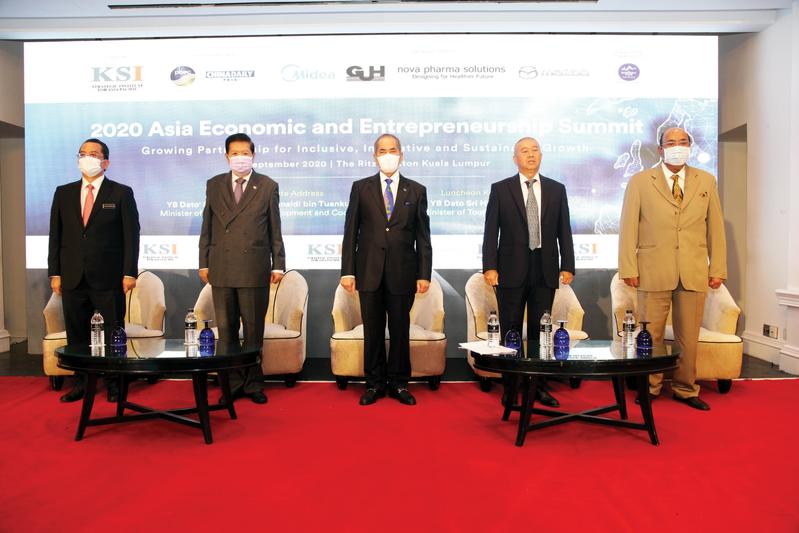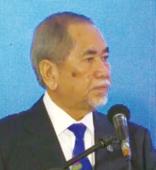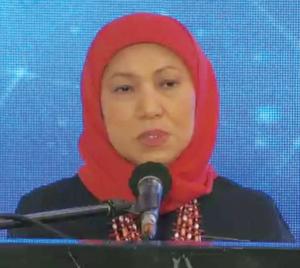 Experts take part in the 2020 Asia Economic and Entrepreneurship Summit in Kuala Lumpur, Malaysia, on Sept 8. (PHOTO PROVIDED TO CHINA DAILY)
Experts take part in the 2020 Asia Economic and Entrepreneurship Summit in Kuala Lumpur, Malaysia, on Sept 8. (PHOTO PROVIDED TO CHINA DAILY)
Increased cross-border cooperation, enhanced public-private partnerships and inclusive digital operations can help Asia-Pacific economies move further on the recovery path after the huge pandemic-related setback, officials said at the 2020 Asia Economic and Entrepreneurship Summit.
Such initiatives are needed if the world is to achieve the United Nations sustainable development goals for all, participants said at the Sept 8 event in Kuala Lumpur.
In the unusual era of risks and opportunities, governments should focus on the 4E’s, namely economic growth, employment opportunities, education and human capital development, and environmental sustainability, Michael Yeoh, president of KSI Strategic Institute for Asia Pacific, said at the forum.
Jointly organized by the KSI Strategic Institute, the Pacific Basin Economic Council and China Daily, the summit featured speeches by two Malaysian ministers and four panel events bearing the theme “Growing Partnership for Inclusive, Innovative and Sustainable Growth’’.
“We have to accept life will never be the same after COVID-19. It pushes us to improvise and innovate,” Malaysia’s Minister of Entrepreneur Development and Cooperatives Wan Junaidi Tuanku Jaafar said in his keynote speech.
The pandemic has shown that “innovative, inclusive and sustainable growth” can only be possible through partnership between the government and the private sector, he said, adding that charting another way of doing business is the “key word of the government”.
Malaysia’s three-R approach, meaning relief, recovery and reform, is gaining momentum. As the country eases lockdown measures, small and medium-sized businesses will see improved cash flows, industrial productivity will increase, and retail sales and wholesale trading activity will pick up.
The country is also banking on the domestic market, and the holding of virtual events, to gradually revive its battered travel and tourism sector.
In her luncheon speech at the summit, Malaysia’s Minister of Tourism, Arts and Culture Nancy Shukri pointed out that “innovation requires new concepts” and that change now becomes a call of the era.
 Wan Junaidi Tuanku Jaafar, Malaysia’s Minister of Entrepreneur Development and Cooperatives. (PHOTO PROVIDED TO CHINA DAILY)
Wan Junaidi Tuanku Jaafar, Malaysia’s Minister of Entrepreneur Development and Cooperatives. (PHOTO PROVIDED TO CHINA DAILY)
Malaysia has introduced robust incentives and plans to revitalize and fully revive the tourism industry by the second quarter of 2021, she said.
The ministry has launched the “Cuti-Cuti Malaysia” TV promotional campaign in August to entice more vacation-goers to explore the country. Cuti means vacation in local language. Authorities are promoting the use of online bookings and contactless transactions for safety and health purposes, and online e-craft bazaars and art festivals are generating interest in the country’s art and culture.
To adapt to the new normal during and after the COVID-19 pandemic and transform, “Asia-Pacific economies can learn from one another and share their experiences” KSI’s Yeoh said, reminding participants of opportunities in startups and digital operations, online education, food supply and delivery, among other things.
Michael Walsh, chief executive of Pacific Basin Economic Council, sees ASEAN emerging stronger from the crisis and moving toward sustainable growth. Among other comments, he said e-commerce can help local businesses adapt to the changes.
Xiao Geng, chairman of Hong Kong Institution for International Finance, said Asia, generally speaking, has become the center of the global economy. And China is creating more opportunities and bigger markets for the world by expanding “dual circulation”, wherein it gives stronger boost to commerce at home while also engaged in external trade.
Among other remarks, Xiao noted that COVID-19 is a “social cost issue” and that the market alone cannot solve it. He cited China, which has mobilized both the central and local governments, allowing the country to apply strict social distancing and traditional health methods to curb the spread of the virus.
Chin Yew Sin, advisor for Asia Pacific region at the Global One Belt One Road Association, said he expects China to be strong both economically and technology-wise in the future as the people are innovative and eager to learn, and as Chinese students are strong in STEM capabilities.
Indonesia, as one of the E-economies — a list that includes Brazil, China, India, Mexico, Russia and Turkey — can fare much better than average as it, too, encourages students to get strong in STEM, Chin said.
Edon Woon, president of Asian Institute of Technology from Thailand, expects more intra-regional cooperation in Asia-Pacific, especially what he calls complementary collaboration among universities and institutions.
Higher education in Asia has good prospects as more talented students are choosing universities in the own region instead of going to Western nations, and as many scholars who were in Western institutions are returning home.
Rajiv Bhatia, distinguished fellow at Mumbai-based foreign policy think tank Gateway House, highlighted the importance of the “Blue Economy” for economic development.
“Industry 4.0 technologies will need to be deployed to generate additional income sources for humankind. Our oceans offer immense potential, but their development needs to be undertaken sustainably, thus making it environment-friendly,” he said.
 Nancy Shukri, Malaysia’s Minister of Tourism, Arts and Culture. (PHOTO PROVIDED TO CHINA DAILY)
Nancy Shukri, Malaysia’s Minister of Tourism, Arts and Culture. (PHOTO PROVIDED TO CHINA DAILY)
Mia Mikic, director of the trade, investment and innovation division at the United Nations Economic and Social Commission for Asia and the Pacific (UNESCAP), said there is a danger that Asia-Pacific countries will lose the gains they had made earlier, due to the pandemic. She said all sectors need some changes if we are to address the socio-economic problems.
“We have to change the way we do business,” she said, noting the need to prioritize initiatives that “leave no one behind” in the United Nations Sustainable Development Goals.
“The pandemic has highlighted that the government cannot do it alone,” said Maria Chin Abdullah, member of parliament for the Malaysian city of Petaling Jaya and former chairperson of the All Party Parliamentarians Group on sustainable development goals (SDGs).
We need a “whole society approach,” she said at a panel discussion, adding that everyone, and not just the government, needs to know more and work toward meeting SDGs.
Realizing the goals needs international cooperation in the direction of helping and enriching each other, regardless of religion, race and ideology, said Dr Dennis Ng, chairman of the Hong Kong-based Institute of International Harmony and Sustainable Development.
“If everyone is independent, sovereign, and can enrich mutually, our world can enter a more peaceful direction, that is, the direction of helping each other,” he said in an online address.
The panelists were of the view that digital operations will help transform societies and overcome “information equality” in developing countries, and even in more developed economies.
Omna Sreeni-Ong, founder of Malaysian consultancy Engender, shared her experiences about engaging with people in slum communities, and seeing capacity in young members there, a strategic principle for SDGs. “It’s about showing respect” to every community so that they can change and share the issues, she said.
Henry Goh, co-founder and chief operating officer at Macrokiosk Bhd, said infrastructure capacity building for the poor and in rural areas enables Malaysia to embrace the digital age.
A similar story is going on in Negara Brunei Darussalam, according to Shazali Sulaiman, partner of Shazali & Partners from Brunei. The government owns key telecom assets to ensure everyone is connected, even in rural and remote areas, he noted, adding that the move effectively ends the “information poverty” that can be seen in some economies.
Adam Yee, president and CEO of Siemens Malaysia, pointed out that there would be challenges in the journey toward digital transformation, and cybersecurity is one of them. Feeling insure on connectivity is a hurdle for everyone, especially those who refuse online purchases and banking, he said.
Law enforcement on privacy protection in any economy is important for the authorities, Yee said.
Diplomats participating in a panel discussion titled “Indo-Pacific Outlook and Vision” noted that the future is all about a rules-based order. “It’s about ensuring that conflict and cooperation are managed in an agreed framework,” said Andrew Goledzinowski, Australia’s High Commissioner to Malaysia. Charles Hay, the British High Commissioner in Malaysia, stressed the need to maintain free and fair trade.
Hiroshi Oka, Ambassador of Japan to Malaysia, said it is important to enhance cross-border connectivity in the international community and encourage more people-to-people exchanges.
Denison Jayasooria, co-chairman of CSO-SDG Alliance Malaysia, said in the end it is not just dollars and cents, but “harmony and peace for not only us and our families, but also for generations to come”.
Contact the writers at prime@chinadailyapac.com


